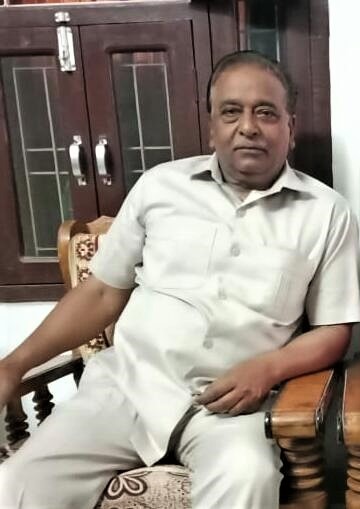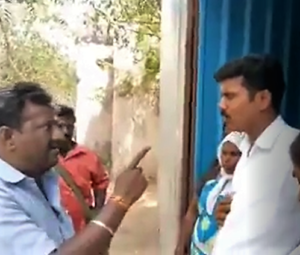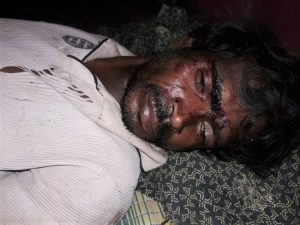This is a blog dedicated to highlight the issue of Christian Persecution in India. The posts here in contain information about Christian Persecution in India from various sources with links and some exclusive to us. No Copyright infringement is intended. This is only for the purpose of spreading awareness about the ongoing Christian persecution in India. We have no political affiliations. We hope for a nation where all could live in peace with each other.
Thursday, December 27, 2018
Maharashtra: Christian gathering attacked during prayer meet, 12 injured
Saturday, July 14, 2018
Christians in Rajasthan, India Harassed with False Charges, Church Leaders Say
‘Total impunity’ in India, as Muslims and Christians ‘bear brunt of ruling ideology’
In Chhattisgarh, tribal leaders ask, ‘How can this be about conversion?’
Friday, July 13, 2018
16 Christians detained under Jharkhand’s ‘anti-conversion law’
20 Indian Christians hurt in attack on prayer meeting in Uttar Pradesh
Saturday, July 07, 2018
Christians played no role in India's freedom struggle: BJP MP Gopal Shetty
The BJP MP also claimed that it was only the Hindus and the Muslims who played a role in India's freedom struggle.
"Christians were British, hence they didn't participate in India's freedom struggle. India was not freed by Hindus or Muslims, we fought as one for our independence," he can be heard as saying in the video.
Shetty made the controversial remark while addressing a gathering during the Eid-e-Milad organized by the Shia Kabrastan Committee at Malad's Malvani here on Sunday.
When asked about the controversial remark he said that his statement has been misinterpreted. But has offered his resignation to the state party president Raosaheb Patil Danve.
Click here for source
Sunday, June 24, 2018
Pastor in India Arrested while Securing Affidavits on Converts’ Faith
 |
| Pastor Maleywar |
Monday, April 23, 2018
BJP's Ballia MP calls Christian missionaries 'threat to country's unity'
"Christian missionaries control the Congress. Sonia Gandhi, the mother of Congress president Rahul Gandhi works on the directions of these missionaries. These missionaries are
a threat for the unity of the country," Singh said while talking to reporters on Saturday.
Singh also alleged that the democracy in the northeastern states of the country has "weakened" due to "conversion of people there into Christianity." "The North-East is under the influence of Christian missionaries. Democracy has weakened due to the conversion of people into Christianity there. The conspiracies hatched by these missionaries are a threat for the country," he added.
The Ballia MP, incidentally, had also alleged recently that the Christian missionaries were behind the vandalisation of the statues of the Dalit icon and key architect of the Indian Constitution, Bhim Rao Ambedkar.
Thursday, March 15, 2018
Christian prayer homes attacked in Madurai
Wednesday, March 14, 2018
Indian policeman joins 50-strong Hindu mob’s attack on churches
 |
Tuesday, March 13, 2018
Uttarakhand cabinet approves draft bill to make forced religious conversions a non-bailable offence
The Uttarakhand state cabinet has approved the draft bill called ‘Dharm Swatantrata Adhiniyam’ under which forced and illegal conversions will be a non-bailable offence. The state government is aiming to curb the incidences of religious conversions by means of force, bribes or incentives and duping. Under this bill, a person, if caught with being involved in such practice will have to face a jail term from one year to five years. The minimum jail term will be two years if the victims belong to SC or ST category.
According to reports, if a person wants to convert voluntarily, he/she will have to submit an affidavit with the respective District Magistrate one month prior, in order to clarify that the conversion is voluntary and not forced.
Any conversions, if found not to have followed the above will be invalidated and considered illegal by the government. If a person wants to convert for the purpose of marriage, he/she will also have to submit the same affidavit.
The Trivendra Singh Rawat led state cabinet convened for four hours
on different issues on Monday in the state assembly. Under this bill,
even organised events for religious conversions will be illegal if not
notified to the government one month prior.
The government’s decision is in line with the order of the Uttarakhand High Court in November last year when the bench headed by Justice Rajiv Sharma had suggested that the state government should formulate the Freedom of Religion Act to check the practice of religious conversion for the sole purpose of facilitating a marriage. The HC had asked the state government to legislate a law on the analogy of the Madhya Pradesh Freedom of Religion Act 1968 and the Himachal Freedom of religion act
2006.
A bench headed by Justice Rajiv Sharma had said, “It needs to be mentioned that the court has come across a number of cases where inter-religion marriages are being organised.
However, in few instances, the conversion from one religion to another religion is a sham conversion only to facilitate the process of
marriage. In order to curb this tendency, the state government is
expected to legislate the Freedom of Religion Act on the analogy of
Madhya Pradesh Freedom of Religion Act, 1968 as well as Himachal Pradesh Freedom of Religion Act, 2006, without hurting the religious sentiments of citizens.”
Under the bill, the immediate family members of the concerned person who has been converted can register a case.
Click here for source
Police asked not to interfere in the civil rights of a pastor in Tamil Nadu
The Madurai Bench of the Madras High Court on Friday directed the Tirunelveli police not to interfere with the civil rights of a pastor who moved the court seeking to restrain the police from questioning members of a church in the name of enquiry.
Justice P. Rajamanickam directed that civil rights should not be interfered with and no questioning be conducted in the name of enquiry.
The petitioner, Soundarapandian, a pastor at the Church of South India (CSI) church in Athisiyapuram, Palayamkottai, said a prayer hall was constructed in 2017 with permission from the Executive Officer of the panchayat. Prayers were held on Fridays and Sundays without causing any hindrance to the public, he said.
However, a few villagers had complained to the V. K. Pudur police that prayers were being held without permission. Following the complaint, the police had been visiting the church in the name of enquiry and questioning its members, he complained.
The petitioner said his freedom of conscience, free profession, practice and propagation of religion guaranteed under the Constitution were affected and sought to restrain the police from conducting such enquiries at the prayer hall.
Click here for source
Indian policeman joins 50-strong Hindu mob’s attack on churches
A Hindu mob raided five churches in the southern Indian state of Tamil Nadu yesterday (11 March), attacking and abusing Christians as they worshipped. Several women were stripped and beaten.
The attackers, who according to witnesses were accompanied by a state-provided police officer, were part of Hindu Munnani, a Tamil Nadu-based organisation formed to defend Hinduism.
The Hindu Munnani District Secretary, Thangam Venkatesh, led the mob, which began its raids early in the morning.
“At about 9am, Venkatesh went to the prayer hall and abused the pastor, Ravi Jacob. He used extremely vulgar language, and then turned on his wife, Persis,” John J.Y. Arul, Chairman of Madurai District Pastors’ Fellowship, told World Watch Monitor.
“The extremists were aggressive and uncontrollable. In front of children and others in the church, they savagely beat up Jacob and Persis. They removed Persis’ saree and repeatedly kicked her in the face,” Arul said.
“I can’t repeat the words they used against Persis. We were shocked by their inhuman behaviour.
“When Persis was crying for help, the police guard with the Munnani leader asked her to ‘prostrate herself at the feet of Thangam Venkatesh and plead for his forgiveness’.
“Persis’ face was swollen and she had to be rushed to hospital.”
The mob also burnt Christian literature, including Bibles.
“The same Hindu Munnani men went to four other churches in the district,” Arul said.
At about 10am the mob went to the Bethesda Worship Centre, where they stripped and attacked three women. Two of the women, Maariyammal, 40, and Annal, 51, were sexually assaulted. A third, Bava Dhaarani, 23, was slapped and punched. Maariyammal tried to lodge a complaint with the police, but she was told police could “only take one complaint per church” and the church pastor had already made a complaint.
The mob told Bethseda’s pastor, Jerome Jagatheesan, “you will be brutally murdered in five days”.
“Their language was filthy,” Jagatheesan told World Watch Monitor. “They called me a woman, saying if I was a man I would not serve Christ. They bullied me, calling me pottai, pottai. It is an offensive word in the Tamil language, used against transgender people and homosexuals.”
Activists in the mob said to Jagatheesan: “If you are a man, why did you convert? Why did you change your god? You are a homosexual who gives his wife to adultery.”
Jagatheesan said: “Their words were brutish. Had I uttered a single word they would have attacked us the same way sister Persis was attacked. They showed no mercy.”
The activists also said to Jagatheesan: “If you want to serve Jesus Christ, go to Bethlehem or the Vatican. Worship him there. Why do you want to make India impure?”
At the church the mob shouted threats to a 19-year-old named James, whose father, Emmanuel, leads another church. The activists called out: “If we continue gathering for Sunday worship and prayers, it will be my dad’s turn next,” James said.
“[Hindu nationalists] are ruling in the centre, it is their government. We Christians are helpless,” he added.
Another pastor, Sagi Sugathia, said the mob “are at least 25 in number and very violent. Our church services had to be stopped because of Thangam Venkatesh and his men”.
Complaints to the police
Later in the day complaints were made at Koodal Pudur and Alanganallur police stations, but police refused to register the case. Koodal Pudur police issued a Community Service Register (CSR) receipt in which they did not reveal the identity of Thangam Venkatesh and the Hindu Munnani workers.
The CSR receipt, filed on the complaint made by Jerome Jagatheesan, said: “Twenty-five unknown miscreants or unidentified people have attacked the Christians.”
Some 200 pastors later demanded that a First Information Report (a victim or witness statement made to police to trigger further investigation) was filed against the Hindu Munnani activists.
A Facebook account in the name of Thangam Venkatesh posted updates on yesterday’s attacks, including a video of Venkatesh shouting abuse at Jagatheesan.
Click here for source
Thursday, March 08, 2018
Hindu Extremists in Eastern India Attack Christians Coming Off Bus
Christians Seriously Injured after Attempted Burial in Eastern India
DELHI, March 5, 2018 (Morning Star News) – Tribal animists upset that Christians tried to bury one of their dead in a village in eastern India seriously injured a 13-year-old girl and others who tried to protect a Christian woman the villagers threatened to burn alive.
On Feb. 26 Christians in Chitrangapalli, Tamguda village, were about to bury the body of a 3-year-old girl who had died of natural causes in Odisha’s state’s Malkangiri District, when villagers reached the field where they were performing last rites. The mob insisted they would not allow a Christian to be buried in their village, even though the burial site was on land owned by one of the Christians, area sources said.
They demanded that the Christians take the body outside the village for burial. After the land owner argued that he was free to bury his dead on his land, the villagers left, only to return at midnight with weapons.
About 20 to 25 villagers carrying wooden sticks surrounded the houses of the three Christian families in the village of nearly 35 families and ordered them to come out. The mob was shouting loudly, reviling them for changing their faith.
Some Christians came out of their houses, and the villagers told them to renounce Christianity. When they refused, the attackers entered their homes, dragged the rest of their family members out and beat them, area residents told Morning Star News.
Savagely beating 45-year-old Nandi Madkami, an aunt of the girl who had died, the assailants threatened to burn her with gasoline they were carrying.
“As they were attempting to burn her, Nandi’s 13-year-old daughter ran to her rescue,” Enka Pusham, a Christian from a neighboring village who gave refuge to the Christian families after they spent the night hiding in the forest, told Morning Star News.
Mob beat Deba Madkami when he tried to rescue his daughter. (Morning Star News)
The villagers began to beat Madkami’s daughter, Savita Madkami, with wooden sticks, leaving her bleeding from head wounds. Savita’s father, Deba Madkami, was beaten when he came to his daughter’s rescue, as was his father, Ganga Madkami, and brother, Jaga Madkami. The elderly Ganga Madkami sustained a broken right hand.
The attackers proceeded to burn the houses of the Christians, destroying a roof.
“The mob also looted 10,000 rupees (US$153) from Jaga Madkami’s house and destroyed his cycle,” Pusham said.
The Christians ran to the jungle to save their lives and spent the night there. One badly injured Christian who could not run was secretly taken in by some kind villagers and kept safe.
The next morning Pusham, from nearby Kalimela village, and other Christians went in search of the Christians hiding in the forest.
“News reached our village that the villagers assaulting the Christians had actually burnt Nandi alive, and we were horrified,” Pusham told Morning Star News. “We started to send messages for help and prayer support on social media.”
Pusham and the others rescued the displaced Christians, who have now taken refuge at an undisclosed location.
That day (Feb. 27) the Christians went to a local police station to file a complaint but were refused, as officers told them to contact the main police station in Kalimela. Police did not help them obtain medical treatment as they customarily would, Pusham said.
“Anti-tetanus injections were all that the Christians were given in the name of first aid,” she said.
After the Christians filed a complaint on Wednesday (Feb. 28) at the Kalimela police station, officers took the wounded to a hospital.
Savita, Ganga Madkami and Jaga Madkami are still receiving hospital treatment. Nandi Madkam, who was threatened with being burned alive, sustained injuries on her legs and back, while Deba Madkami and Jaga Madkami have injuries on their legs, face and back. Savita has a severe wound on her head.
“The police had assured us that they would arrest the attackers, but we have not heard from them since,” said Pusham.
Christian leaders from Malkangiri approached police, resulting in a First Information Report being filed against the assailants.
Those assaulted are members of the Indian Missionary Society Church in Pulimtla village, six kilometers (less than four miles) from their home.
After the attack, the villagers are not allowing the Christians to return to their homes or enter the village.
“We had sent a known person to the Tamguda village to assess the situation there,” Pusham said. “He returned to report that the villagers are waiting to attack these families if they try to return to their homes.”
The three families had already been boycotted in their village, she said.
“They were not allowed to fetch water nor associate with the other villagers,” she said. “In September of last year, animals belonging to the Christian families were taken away and were slaughtered. But they have stood strong in their faith.”
On Friday (March 2), Christian leaders from Malkangiri area, along with the police, arranged for a peace meeting between the leaders of the attackers and the Christians. It may be possible for the Christians to return to their houses soon, but at this writing the area remains tense, and the assaulted Christians are still waiting to return home.
Click here for source
